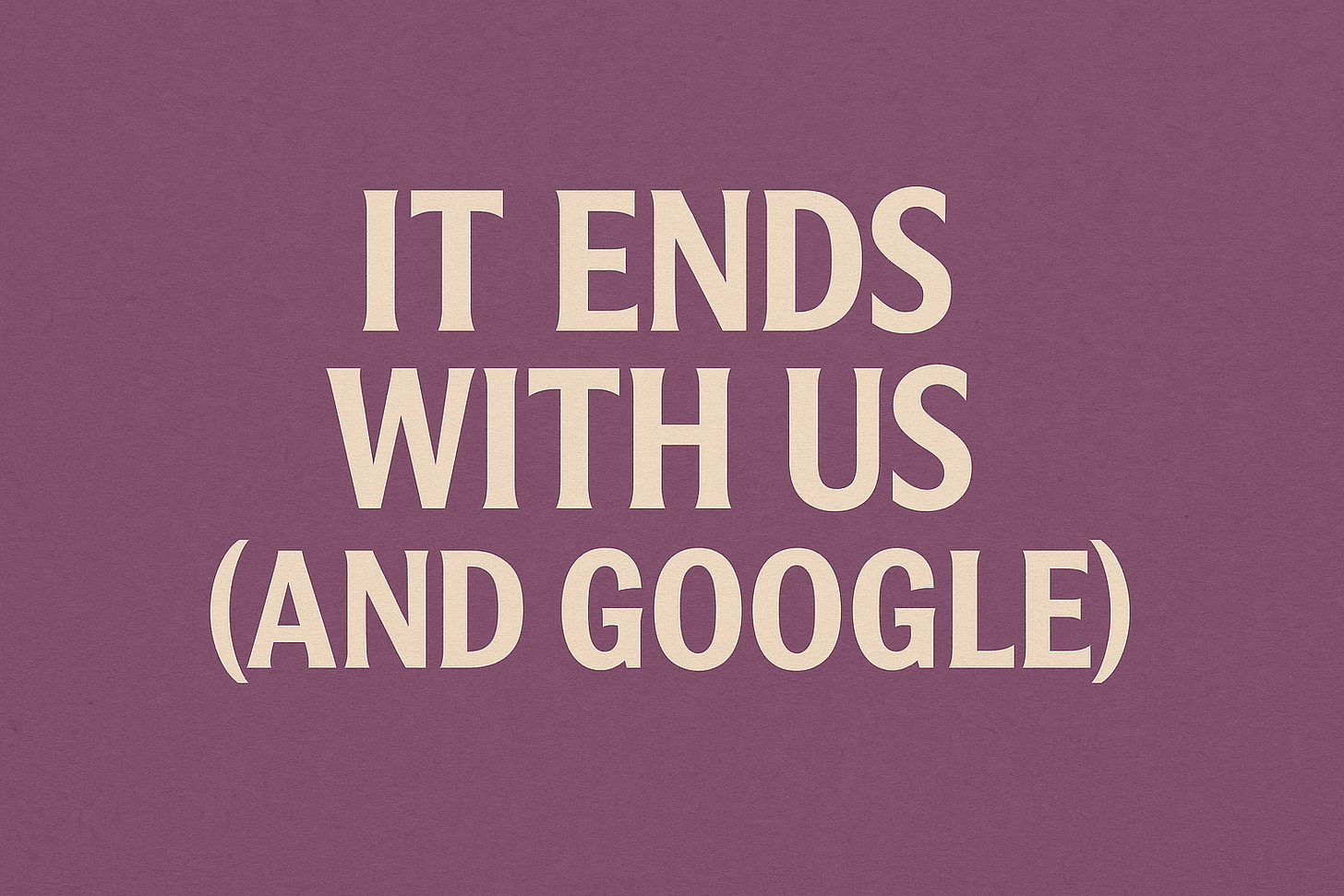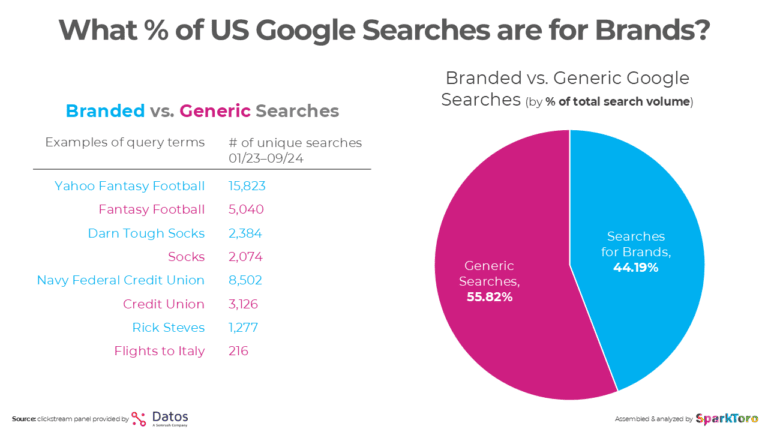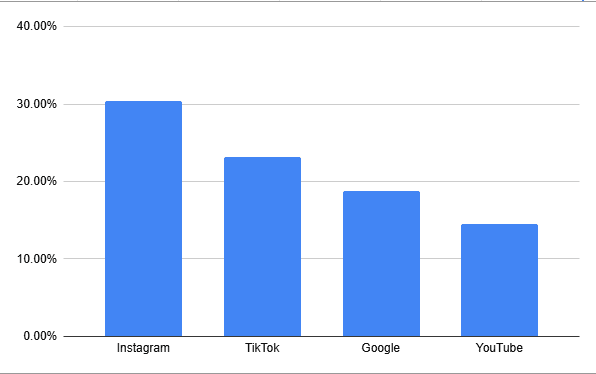It Ends With Us (and Google)
The funnel is messy and the buyer journey is not a straight-line anymore. I think we all know that by now, but how to tackle that from an SEO standpoint? the ideal funnel is broken, and if you're not adapting, your SEO strategy maybe broken too!
TL;DR
Organic search is not synonyms of Google, it's more.
44% of all searches on Google are BRANDED SEARCHES, people are going to other platforms.
39% of consumers use Pinterest as a search engine.
People want authenticity, can you give it to them?
Find where your users are searching, and repurpose your content there too.
Give special attention to your bottom of funnel conversion pages, to make sure that wherever the user goes... they end their journey with us, on our websites.
Once upon a time....
Rand Fishkin's research on how people use Google is very important. It highlights so many important things but here are 2 things that stood out for me:
44% of all searches on Google are BRANDED SEARCHES
148 keywords account for 15% of all Google searches (for queries w/ at least 100 searches). Navigational query terms like:
YouTube
Gmail
Amazon
Facebook
ChatGPT
Google Translate
WhatsApp Web
Google Maps
Google Docs
Instagram
Weather
Netflix
Speed Test
Calculator
Those two points tell me one thing, we cannot think of organic traffic as Google only traffic anymore. Other platforms are part of the game right now, we're just ignoring that in our strategies for some reason 🤷
Hidden in plain sight
A new report highlights how "Pinterest is emerging as a go-to search engine".... we NEVER talk about Pinterest in SEO. Tiktok as a search engine, Instagram even sometimes come up, but not Pinterest. It's time we brush-up on Pinterest SEO.
Key takeaways from the report:
39% of consumers use Pinterest as a search engine.
36% of consumers start their searches on Pinterest instead of Google, with Gen Z being the most likely (39%).
24% of business owners use Pinterest, and nearly a quarter plan to increase their ad spending on the platform this year.
Is Pinterest the future of e-commerce? 80% of businesses believe it outperforms other search platforms in driving engagement.
Every single word above is mind-blowing, and opens up so many opportunities for SEOs. We keep talking about how Google is sending less and less traffic to publishers, but Google is not the only place searchers go to!
There's also more obsession with LLMs traffic than Pinterest, despite knowing that LLMs have a much smaller market share. There are so many other places we should be dedicating our attention, and we're not!
Just a reminder, in another survey, when asked where they most often discover new products, 18- to 27-year-old consumers said:
Instagram: 30.4%
TikTok: 23.2%
Google: 18.8%
YouTube: 14.5%
Does that mean you need to be on all those platforms? Nop! you only need to be everywhere your customers are. The organic user journey is now multiplatform... let that sink in!
Reddit... Say no more 😸
Do we really need to bring up reddit again? I guess by now we all know that people LOVE reddit:
they append "reddit" to their searches on Google
LLMs use it for training data and gives it relatively more weight
Google's partnered with reddit
I have plans for reddit, I want to test few ideas, and I want to analyze ranking reddit URLs to answer one question: "how does google choose reddit URLs"... is date a factor? is engagement a factor? is the subreddit size a factor?
Video content because people want to hear from other people
people figured out that the reviews system can be gamed, so they're not looking for real authentic content and reviews. That explains why many use TikTok as a search engine to find recommendations for products or services.
This is also what Wil Reynolds is talking about in this short video that he shared on LinkedIn recently:
Traditional search engines set specific requirements (like putting certain keywords on pages) that companies follow to "rank" and these requirements often have little to do with understanding customer needs or genuine practices. If you implement those tactics on your website, you get rewarded, even if your website lacks authenticity.
On the other hand, Wil also argues that LLMs reward websites that better align with the user intent and what the user is actually looking for.
💡 People want authenticity, can you give it to them?
Something about AI because we have to
It wouldn't be a blog post in 2025 if we don't bring up AI and LLMs, an AI Search Study found that: Product Content Makes Up 70% Of Citations [source].
💡 Bottom of funnel pages, your money/conversion pages just got more important.
Connecting the dots
The evidence is clear: the "search" landscape is far broader and more diverse than just Google's main SERP. To have a winning SEO strategy:
Expand your definition of "search": what other platforms that your customers are using to search? Repurpose your content and use it on those platforms.
Learn and test platform specific optimizations as needed to gain visibility.
Authenticity: Create content that genuinely helps, informs, and engages. Real reviews, user-generated content (where appropriate).. this is why I don't think AI-generated content is a good idea... it just rehashes what's already there, no unique perspective no value added...
Think "content ecosystem," not just "website": Your website is crucial, but it's part of a larger ecosystem. How does your content on other platforms support your overall goals and drive users through their unique, non-linear journeys?
Bottom of funnel pages: they get cited more often in AI Overviews, they are your ultimate traffic goal, create top-notch highly converting pages.... this is where you need to do more research, maybe even tailor landing pages for specific audiences e.g "email marketing software for small businesses, email marketing software for real estate agents", etc....
The messy funnel isn't a problem to be solved; it's a reality to be adapt to. We want to make sure that wherever the user is searching... they end with us, on our websites.
Thanks for reading so far and see you next newsletter!
Disclaimer: I used different LLMs to help me phrase some of the content in this blog. The ideas are mine, but in few instances the words are not.




